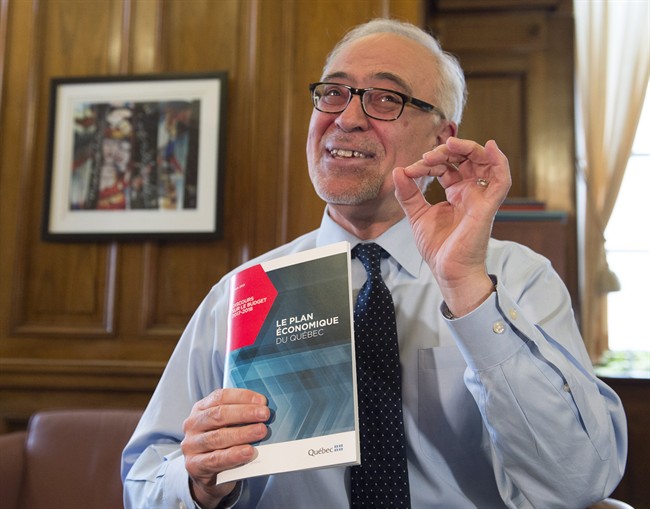With seven out of 10 provincial budgets out, Quebec stands out as one of the stars.

Not only did the province post its third consecutive balanced budget, it is one of the few so far, along with British Columbia, Nova Scotia and Prince Edward Island, to project no deficits for several years. (P.E.I. does expect a small deficit for 2016-2017 but forecasts three years of surpluses after that.)
But Quebec even had room for about $1 billion worth of income-tax cuts and a spending boost of 4.1 per cent, much of which will go to health care and education.
WATCH BELOW: Quebec budget 2017: income-tax cuts, no more health contribution

Quebec expects a budget surplus of $250 million for 2016-2017, which is on top of over $2 billion the province is stashing away in its Generations Fund, meant to pay off the province’s debt.
READ MORE: Quebec’s $2 billion surplus in 2016-17 will go to Generations Fund
That’s a sharp contrast with projected shortfalls in many western provinces. Alberta expects deficits of $10.8 billion in 2016-17, Saskatchewan of nearly $1.3 billion, and Manitoba, which will table its budget on April 11, had previously forecast a deficit of $872 million.
The federal deficit, meanwhile, is expected to come in at $23 billion for the same period.
READ MORE: Highlights from Alberta Budget 2017
- Posters promoting ‘Steal From Loblaws Day’ are circulating. How did we get here?
- Canadian food banks are on the brink: ‘This is not a sustainable situation’
- Video shows Ontario police sharing Trudeau’s location with protester, investigation launched
- Solar eclipse eye damage: More than 160 cases reported in Ontario, Quebec
Quebec earned some rare praise from U.S. credit rating agency Moody’s, which called Quebec “a rarefied space in Canada” for its commitment to a balanced budget, according to the Montreal Gazette.
Quebec’s economy is on a roll
Helping the balancing act of Liberal Quebec Premier Philippe Couillard is an economy that has rarely had it so good.
The economy expanded by a solid two per cent in 2016, its best performance since 2010, according to BMO economist Robert Kavcic.
That’s still behind British Columbia and Ontario, which are expected to post growth of 3.3 per cent and 2.6 per cent for 2016 according to RBC. But it’s a remarkable feat for Quebec, which has been tagging along at roughly 1.2 per cent between 2012 and 2015, as Kavcic noted.
WATCH BELOW: Quebec budget 2017: More money for students with learning disabilities

Even more remarkable is Quebec’s unemployment rate. The figure stood at 6.2 per cent in January, the lowest rate in 40 years. The number was also below Canada’s average of 6.8 per cent for the month.
READ MORE: Canadian economy could outpace U.S. in 2017 — unless America’s protectionism kills that momentum
Of course, Quebec is still Quebec. Despite three years of balanced budgets, the province will still have roughly $207 billion in debt by the end of 2016-2017, equivalent to 52.7 per cent of its GDP, the highest in Canada.
The debt-to-GDP ratio measures the size of government liabilities as a share of the economy. Generally, economists recommend keeping that ratio at 30-40 per cent or lower and warn that substantially higher levels are likely to be harmful to economic growth. Canada’s debt-to-GDP ratio currently stands at 31.5 per cent and is projected to dip to 30.9 per cent by 2021-2022, according to the latest federal budget.
READ MORE: Federal Budget 2017 in 3 charts
And for all its recent budget deficits, Alberta’s debt-to-GDP ratio is just over 3 per cent.
READ MORE: Canadian job numbers beat expectations, as full-time hiring soars
Quebec’s rapidly aging population is also a debt ticking time bomb that will likely drive up health-care costs dramatically.
Still, there is no denying that for now at least, Quebec’s economy is stronger and healthier than it has been for a long time.
During the six months ending in January 2017, it created a whopping 89,000 jobs, 80 per cent of which were full-time, with two-thirds coming from the private sector, according to RBC.
“Quebec accounted for almost four out of 10 new jobs created during this period in Canada — surpassed only by Ontario,” noted RBC economist Robert Hogue.
And with the Couillard government now dialling back some of its austerity measures, Quebec should be able to “keep wind in the economy’s sail,” according to Hogue.




Comments